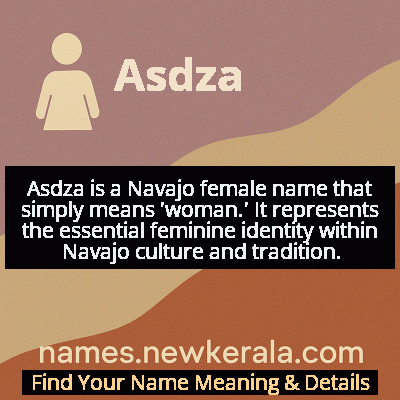Asdza Name Meaning & Details
Origin, Popularity, Numerology Analysis & Name Meaning of Asdza
Discover the origin, meaning, and cultural significance of the name ASDZA. Delve into its historical roots and explore the lasting impact it has had on communities and traditions.
Name
Asdza
Gender
Female
Origin
Native
Lucky Number
6
Meaning of the Name - Asdza
Asdza is a Navajo female name that simply means 'woman.' It represents the essential feminine identity within Navajo culture and tradition.
Asdza - Complete Numerology Analysis
Your Numerology Number
Based on Pythagorean Numerology System
Ruling Planet
Venus
Positive Nature
Harmonious, responsible, caring, and artistic.
Negative Traits
Overly idealistic, superficial, possessive, or jealous.
Lucky Colours
Pink, turquoise.
Lucky Days
Friday.
Lucky Stones
Diamond, turquoise.
Harmony Numbers
2, 3, 9.
Best Suited Professions
Artists, musicians, teachers, healthcare workers.
What People Like About You
Warmth, nurturing nature, artistic flair.
Famous People Named Asdza
Asdzaa Tl'ogi
Navajo Weaver
Master weaver known for intricate Two Grey Hills patterns
Asdzaa Nadleehi
Cultural Preservationist
Documented traditional Navajo ceremonies and oral histories
Asdzaa Bik'ehgo
Educator
Founded first Navajo language immersion school
Name Variations & International Equivalents
Click on blue names to explore their detailed meanings. Gray names with will be available soon.
Cultural & Historical Significance
As carriers of cultural knowledge, weavers of stories and textiles, and maintainers of ceremonial traditions, women named Asdza embody the strength and resilience that has sustained Navajo people through centuries of change while preserving their unique identity and spiritual practices. The name reflects the matrilineal nature of Navajo society, where clan identity and property traditionally pass through the mother's line, making women the guardians of cultural continuity.
Extended Personality Analysis
Women named Asdza are often perceived as embodying traditional Navajo feminine virtues of strength, wisdom, and nurturing care. They typically demonstrate deep connection to family and community, serving as pillars of support and repositories of cultural knowledge. These individuals often exhibit remarkable resilience and practical wisdom, balancing traditional values with contemporary challenges.
Many display strong leadership qualities tempered with humility, and they frequently serve as mediators and peacemakers within their social circles. Their personality often reflects the Navajo concept of walking in beauty - maintaining harmony in relationships and approaching life with grace and dignity regardless of circumstances. They tend to be deeply spiritual while remaining grounded in practical realities, embodying the balance between tradition and adaptation that has characterized Navajo survival and success.
Modern Usage & Popularity
In contemporary times, Asdza continues to be used within Navajo communities as both a given name and an honorific, though it's more commonly encountered as part of compound names or in traditional contexts. The name has seen a modest resurgence among younger Navajo families seeking to reconnect with their linguistic heritage and cultural identity. While not commonly used outside Navajo communities, it appears occasionally in academic and cultural contexts when discussing Indigenous identity and women's roles. The name maintains its traditional significance while adapting to modern naming conventions, sometimes being paired with more contemporary middle names or used in educational settings to teach children about their cultural heritage.
Symbolic & Spiritual Meanings
Symbolically, Asdza represents the fundamental feminine energy that sustains and nurtures life in Navajo philosophy. It embodies the concepts of creation, protection, and cyclical renewal - mirroring the natural world's rhythms and the changing seasons. The name carries deep connotations of the earth itself, representing stability, fertility, and the interconnectedness of all living things within the Navajo worldview. It symbolizes the essential balance between strength and gentleness, tradition and adaptation, serving as a living connection to ancestral wisdom and cultural continuity in a rapidly changing world while maintaining the core values that have defined Navajo identity for generations.

